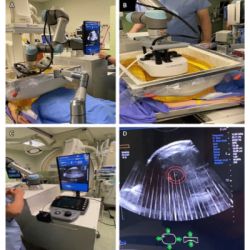New Yale-led research demonstrates that thermal ablation is safe and effective in the treatment of early-stage lung cancer. Since ablation uses no radiation, thus reducing medical cost, this approach may be a viable option for patients who cannot undergo lung cancer surgery because of age or health status, according to the study published in the journal Radiology.
Non-small cell lung cancer (NSCLC) accounts for approximately 85 percent of all cases of lung cancer, the leading cause of cancer-related mortality worldwide. Surgery is the treatment of choice for early-stage disease, but older patients and those with other conditions may not be ideal candidates due to a higher risk of complications.
In thermal ablation, a probe is inserted directly into the tumour under precise imaging guidance. Cancer-killing treatment is then applied in the form of extreme heat, extreme cold or radio waves that destroy the tumour.
The Yale study compared the use of ablation with stereotactic radiotherapy (SRT) – in which tumour cells are destroyed with targeted doses of radiation – for the treatment of early-stage NSCLC. The study group included almost 29,000 patients from the 2004-2013 National Cancer Database, including more than 1,100 who had undergone thermal ablation. Researchers compared outcomes over several years.
Both treatment methods delivered comparable performance in terms of survival rates. The two-year survival rate in the thermal ablation group was slightly more than 65 percent, compared with 64.5 percent for the SRT group. At five years, survival rates were just below 25 percent for the ablation group and slightly more than 26 percent for the SRT group.
"Thermal ablation is most often a one-time treatment, unlike SRT, which requires multiple visits," says study senior author Hyun S. "Kevin" Kim, MD, from Yale Cancer Center and Yale School of Medicine in New Haven, Conn. "In addition, ablation delivers highly accurate and precise localised treatment only to cancer cells, minimising the effects to surrounding tissue and keeping the toxicity low."
Other advantages of thermal ablation include direct access to the tumour itself, which enables physicians to collect biopsy samples during the procedure – an option not available with SRT.
"This is a real value to our patients, especially as tissue sampling becomes more and more important in personalised, precision cancer treatments," according to Dr. Kim, head of the Interventional Oncology Programme at Yale.
The one-time treatment also has lower direct costs for patients and insurance providers, Dr. Kim points out, and could prove to be a more cost-effective alternative to radiation therapy.
Source: RSNA
Image Credit: RSNA
Latest Articles
lung cancer, Thermal ablation, Non-small cell lung cancer
New Yale-led research demonstrates that thermal ablation is safe and effective in the treatment of early-stage lung cancer. Since ablation uses no radiation, thus reducing medical cost, this approach may be a viable option for patients who cannot undergo



























